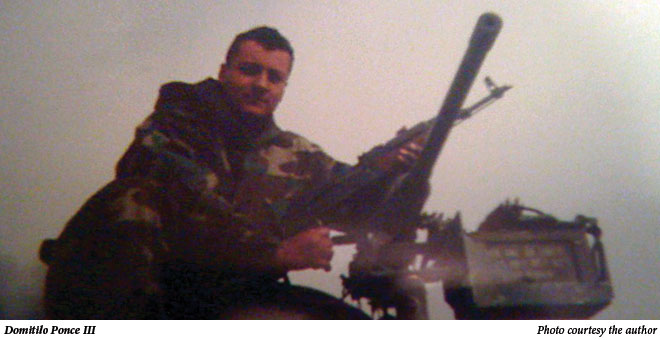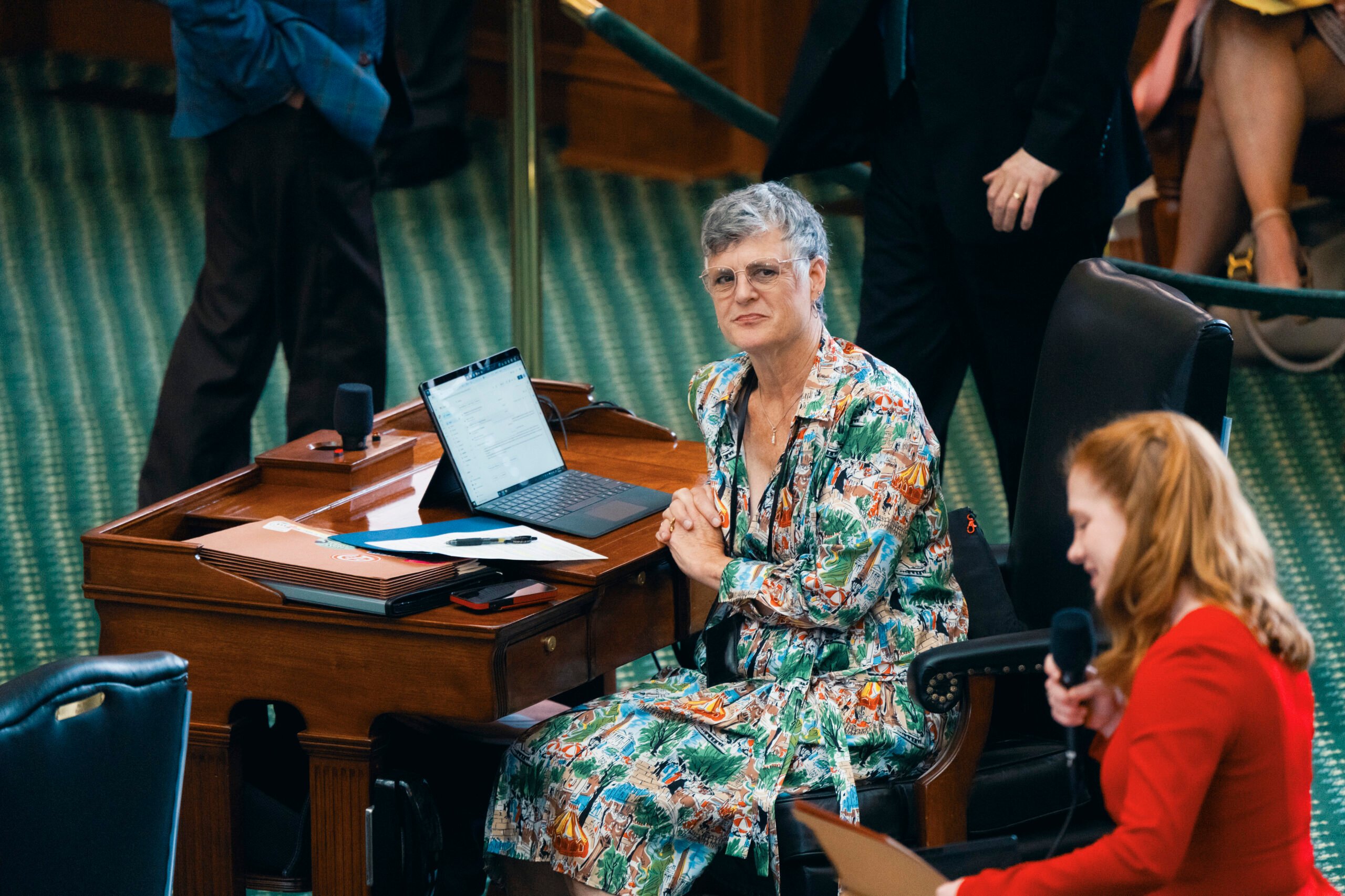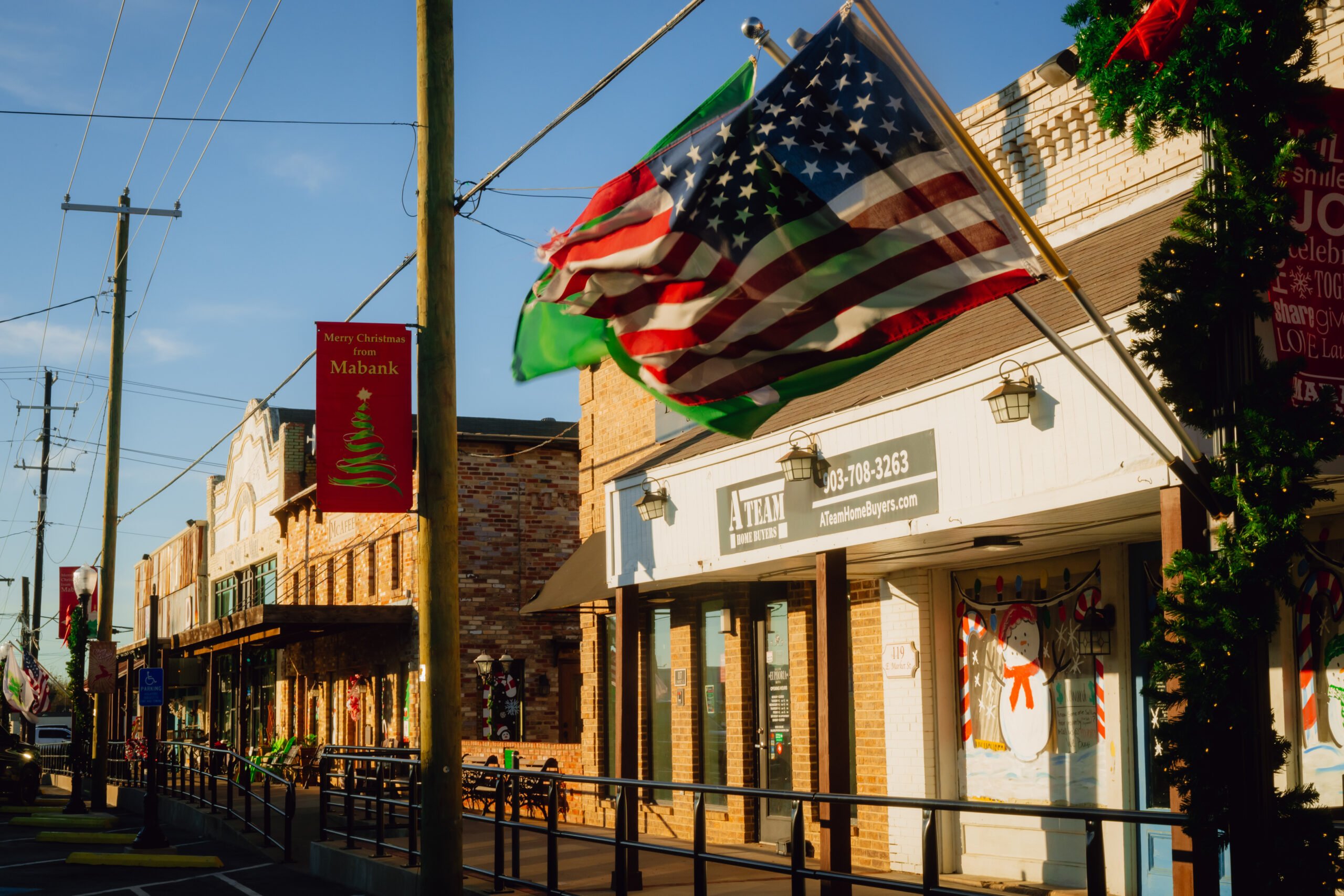Post-Traumatic
Three Texas Veterans on the Road to Recovery
The following narratives were written by Texas veterans living with post-traumatic stress disorder (PTSD), a condition that affects a growing number of soldiers returning from Iraq and Afghanistan. As part of their recovery process, they are writing about their lives and combat experiences as part of the Veterans Writing Project. Our special thanks to Ben Snyder, an Austin playwright who mentors the veterans, for his editing assistance.
Clayton Griffin
When I was born in Texarkana in October 1975, the country was still reeling from losing 50,000 of its best and brightest to the most unpopular war in American history. Who would have ever imagined that only 30 years later the same country would send this baby boy to Asia to fight another war? But they did and that is my story.
Growing up in and around Texarkana was just like any other place, I guess. Visiting family when we got the chance, making fun of your little brother because that’s what your older brother did to you, worrying about everything but grades in high school and later wishing you had worried about grades more.
By the time I did graduate from high school, I decided to take some time off from school. After a string of minimum-wage jobs I knew I wanted more, but I didn’t want to take out a huge loan for college, so I enlisted in the Air Force.
In 10 short years [beginning in 1997], I deployed five times, twice to Saudi Arabia. My last mission was to Iraq [with the 101st Airborne], where I served as a convoy commander, completed over 65 combat patrols and experienced many combat engagements. I saw it all firsthand: mortars, bombs, firefights … everything.
Upon returning from Iraq, Griffin began to suffer from PTSD. He experienced anxiety attacks while driving and while in public. Bouts of depression would come and go, seemingly inexplicably. Sometimes he couldn’t even force himself to move because it took too much energy. But the uncontrollable rage was what bothered him the most. Fortunately, it was never focused on any family members or close friends, but if someone did something Griffin didn’t like, or exhibited unusual mannerisms, adrenaline flowed through him with the force of Niagara Falls. He felt like he was losing control of himself.

It took six months for me to seek help for my post-traumatic stress. The symptoms were completely debilitating: anxiety, depression, rage and paranoia. Ultimately these and other problems all led to several months of counseling, medication and a discharge from the military.
There are some things everyone should know about combat-related PTSD. First of all, there is a lot of guilt associated with it. No matter what physical malady you endured, it is never enough to free you from the guilt that combat dishes out.
Maybe the biggest factors that need to be addressed are shame and fear. Many times veterans have gone directly against the morals that they hold dear. We have looked inside our souls and seen what could be. We have seen the evil that a man is capable of, even within ourselves. We don’t want to share these things with our spouses, moms, dads, brothers or anyone because we are ashamed of what we see in ourselves. We are afraid our families may think of us as bad people.
The stigma surrounding PTSD is also a deterrent to seeking help. This is why so many veterans keep it all inside them, and let it eat at them like a cancer. Seeking psychiatric help was the most difficult thing I ever did in my entire military career.
Domitilo Ponce III
I was born in Austin, in Seton Hospital, in 1980. Growing up, I spent a lot of time outdoors, playing Davy Crockett and Daniel Boone. Then I got into G.I. Joe and that was it. I got my first BB gun and since then I knew what I was going to be for Halloween every year. As I grew up I was a military fanatic, reading up on military equipment, watching PBS specials on World War II and Vietnam. When I got to high school, I joined the Air Force Junior ROTC program. I became the armed drill team commander, and then the deputy commander. I finalized the branch of service I wanted to be part of. I wanted to travel, I wanted to shoot guns, and I wanted the best training. The one that offered all three was the Marine Corps.

Ponce left for boot camp in September 1999. He was first stationed in 29 Palms, Calif., where he became a championship gunner. Two years into his service, he recalls:
One day we were in the field and things got quiet. I was asked to pull out my mini-TV and there it was: the second [World Trade Center] tower collapsing. As Marines we couldn’t wait to go to work. We got to Kuwait and prepared to get to work. That’s when my life started to change.
On March 18, 2003, Saddam started launching Scuds, so we moved up to the border to breach. Providing overwatch, we got shelled south of Safwan, and I found myself asking, “What the hell did I get into?” I accepted the fact that I might not make it back, that the last time I had hugged, or tasted certain foods, or loved, had been done. So I let go. By letting go, a void was created. That void was replaced by the rush and adrenaline of combat.
Ponce’s unit made it to Baghdad, and then was ordered to Karbala. Following one battle, Ponce remembers watching as people gathered body parts, “as if they were picking up trash.” All of a sudden the cracks of small arms firing were heard. “The bus, the bus, they’re shooting from the bus!” another soldier yelled. A white mid-sized bus came screeching around the curve with its glass being shot out and flashes coming from the inside. It burst into flames. From the fire emerged a tall, dark, slender man in a green uniform.
He sprints toward my right firing his pistol. As I aim in, I notice the top of his hair is still smoldering. For some reason I smell the burnt hair amidst the gunpowder, burning rubber, diesel and flesh. As I pull the trigger, feeling my gun jerk as every round popped off with a deepened boom, I see my rounds striking the ground slightly in front and behind the target. I adjust, and my rounds strike the target in the hip, shoulder and head, with devastating thumps and cracks, spinning him around, causing him to land on his back just inside a guard booth. A reporter in the background is taking snapshots. We secure the site and walk toward the fallen enemy soldier to record and register the kill. I catch a glimpse of something gleaming at me. It is a wedding ring, on his left ring finger.
Once Ponce’s contract was up, he returned from Iraq to “a hero’s welcome.”
I had a month to process out. Barracks life wasn’t the same. The base, the nightclubs, free time, everything seemed different. It was different. Some of us were shot, some of us were missing limbs, some of us had shrapnel wounds.
I returned to a welcome-home dinner and the comforts of home. I was home, but it didn’t feel like it. I felt naked, vulnerable in public, and being next to windows just made me want to hurry and leave. I started college, but couldn’t be in the same building longer than two hours. I was so curious about every sound in the hallway. Eventually my grades started to drop. I tried being social but found myself always getting into fights or into situations that were risky and dangerous to some, but exciting to us. This is a result of the rush or adrenaline that filled the emotional void that we incurred as the result of our combat experience. For some this is replaced with self-medication and/or some form of habit that turns into an addiction, such as alcoholism, workaholism, or being an exercise-holic. It’s no one’s fault, it’s just that things evolve to the next level. … At times a combination of the atmospheric conditions such as heat, environmental factors such as crowds, traffic, buildings and visual cues, and intrusive images or questions will send one into an episode of PTSD.
The war is urban, and the home environment is urban. The threats were asymmetrical, and every now and then in our modern society threats are acted out as in combat, or received the same way. Veterans will act in a way that we know allows us to survive, which has been proven in real-life experiences. We are in our homes now, but always on the outside, wondering what that noise was, or where that light came from and went.
Carlette “Sassy” Sattlewhite
I was born and raised in Austin. I gained the nickname of “Sassy Michele” because of my strong-willed mentality and focus on what I wanted to achieve in my professional and personal life. When I graduated Crockett High School, I joined the U.S. Navy at age 18 because I felt that I needed to learn discipline.
The Navy is where I learned to interact and work with diverse groups of people from different backgrounds, religions and origins. I was an operations specialist, but worked as a law-enforcement officer, stationed at Guantanamo Bay, Cuba; Dam Neck, Va.; Rota, Spain; and in Germany.
After completing a four-year tour, I came back home and joined the U.S. Navy Reserve and became a deputy constable for Travis County District 2. I learned to build underwater mines from bomb bodies, which was very interesting to me because I never wanted to build a dud. Building a dud could cost the life of our troops in combat or at sea.
After two years [in the Reserve] I joined the U.S. Air Force because I wanted to expand my skills and abilities. In the Air Force, I experienced several racism issues. There were not that many black troops stationed in the unit, especially black females. This unit thought they were going to bully me around, but I did not stand for that because I had prior military experience.
My unit would not allow me to get qualified in such areas as patrol. I was assigned to the flight line. I used to receive my flight-line plot board with all my aircraft with racial drawings on it. At first I did not say anything about the drawings, until there was one of three KKK men looking down into a well at a black man [lying at the bottom]. That is when enough was enough. I reported the drawings to my supervisor. He found the troop responsible; the commander just ordered him to apologize to every black person. My unit covered up the fact that there were racial issues going on. Every time a black male got into some trouble, they would get kicked out of the military. When a white person got into trouble for the same offense, either nothing happened or they got a letter of reprimand: totally unfair and unethical. But I had to watch this go on, and things just got worse after the 9/11 attacks.
I began to fight back. I filed an official report with the Military Equal Opportunity (MEO) office. I knew that I was going to get retaliated against, but I could not stand to watch myself and other black troops go through this type of treatment. The MEO office began to investigate my claim. When my commander found out, he was very upset, to use the friendliest term. The commander called a mandatory meeting and threatened everyone: If MEO found any truth to the claim, we were going to pay. He had found out that I was the one who filed the claim, and threatened me to keep my mouth shut.
Supervisors and sargeants were trying to write me up for this and that, to make it seem like I was a bad troop. I was ordered to mental health several times, so they could try and make it look like I had a mental problem.
The racism issues I had to deal with alone eventually started to take their toll on my health. I continued to pray to God to help find an end to these racism issues that I had been experiencing. I prayed for patience and wisdom.
Well, one day while in the mental-health office, a colonel told me that he heard that my commander was trying to set me up to get into some trouble that I could not get out of. I asked him what I should do and he said, “Watch your back.” I thought to myself, this is sad because here we are, supposed to be a team and fighting a war. Thank God the colonel helped me get out of the Air Force with an honorable discharge, seven months before my contract ended, because he feared for my safety.
After her discharge, Satterwhite often felt like she didn’t fit back into the civilian world. She had a habit of driving her vehicle fast, due to her training in the military. She began to get paranoid when others followed too close. Once, someone almost hit her car; Satterwhite’s evasive-driving training kicked in. She watched the driver in her rear-view mirror and when the car turned into a gas station, Satterwhite made a U-turn and pulled up next to the driver, so close that he could not get out of his door. Overcome with anger, she glared at the driver, who called the police. Satterwhite wanted to leave the scene, but her mind would not give her control. A few days later, she went to a doctor and was diagnosed with PTSD.
In the hospital, Satterwhite had time to reflect and realize how much she had held onto from her military experiences. She had never spoken about them. She began treatment but refused medication because she didn’t want to be labeled as “crazy.” Since then, Satterwhite has been taking steps to change the negative energy into positive. She renamed her PTSD as People Trust Smiles Daily to help put a positive spin on controlling her emotions. She says the Veterans Writing Project has been the best outlet for expressing her feelings and experiences. Though writing, Satterwhite is gaining control and finding ways to function in the real world again.


